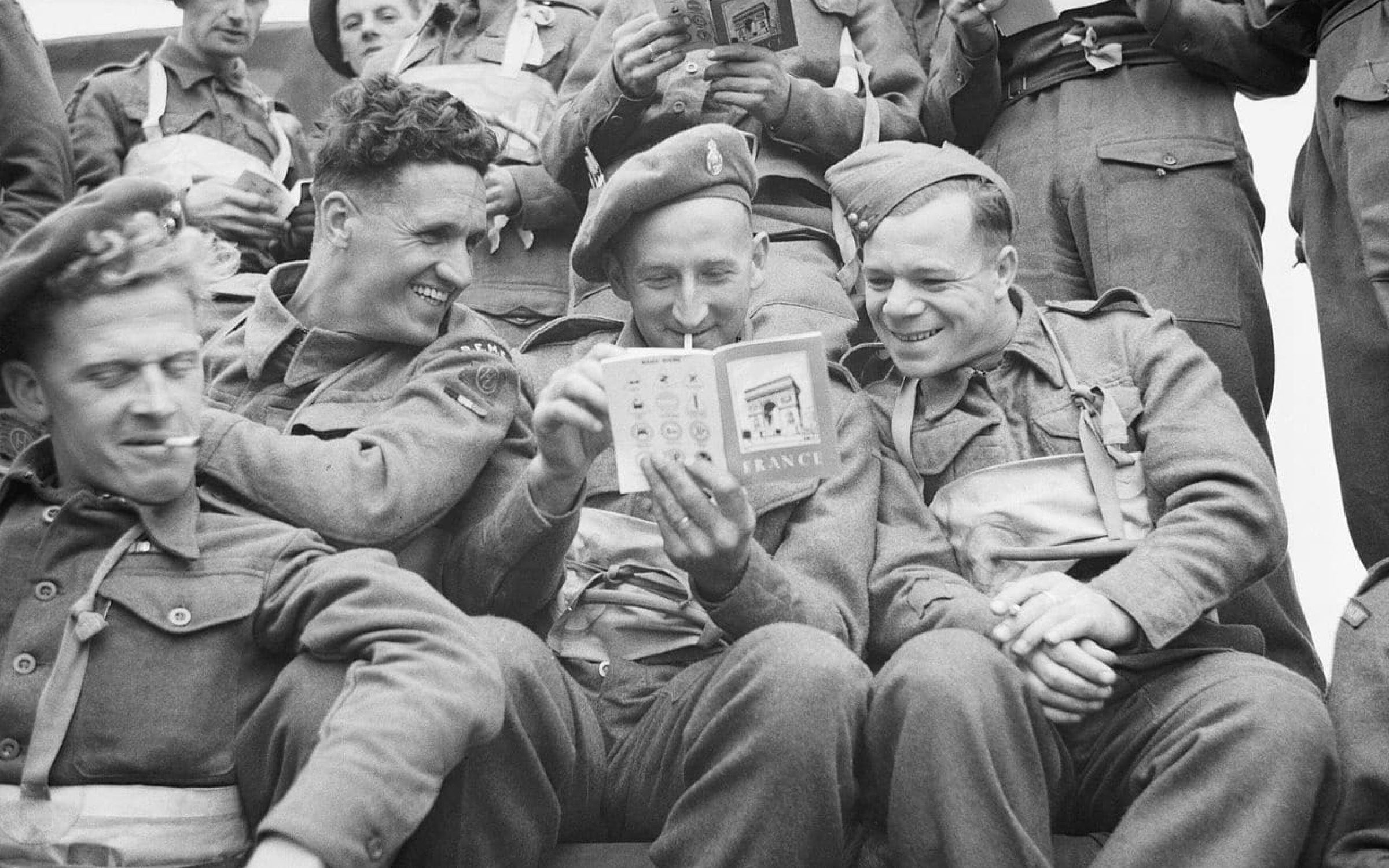Today is Thursday, the day of the week on which I normally do not write. Or at least not a column for wider consumption. But today is also 6 June, and, by dint of it being the year 2024, also the 80th anniversary of the Normandy landings, of the first day of Operation Overlord, of D-Day. I happened to be playing bridge last night with a dear friend who was a née Fraser, a Fraser of Lovatt. Those who have seen the great 1962 epic movie The Longest Day, based on the Cornelius Ryan book, will no doubt remember the invasion opening with the gliders landing and the coup de main at Pegasus Bridge. The small band of airborne troops were to “hold until relieved”, the relief arriving in the form of 4 Commando, led by Shimi Fraser, 15th Lord Lovatt, who effectively founded what are today the Royal Marine Commandos and who still strode into battle accompanied by his personal piper. My friend is proud of the family connection and urged me to write a few words today. It was a request I could not deny.
D-Day was of course scheduled for 5 June to meet the coinciding of high tide and full moon, but Atlantic storms would have made the crossing in those conditions nigh on impossible. American military commanders, always gung-ho for a fight and frequently regarding the allied British counterparts as wusses, wanted to go on the 5th. Thankfully, the Supreme Commander General Dwight “Ike” Eisenhower did not listen to them but to the British meteorologist Group Captain James Stagg who, using the latest technology – a chain of housewives who took barometer readings across Ireland and reported their findings to the Met service – forecast a break in the weather on the following day and took the hard decision to postpone by 24 hours. Thus, D-Day fell on and is commemorated on 6 June.
The film The Longest Day – sadly rarely shown nowadays as it is in antiquated black and white – starred everybody who in 1962 was anybody, from John Wayne to Robert Mitchum to Richard Burton. But, to me, the star is Richard Todd who plays the part of Major John Howard of the Oxfordshire and Buckinghamshire Light Infantry, known as the Ox and Bucks which is the regiment local to where I live, and who led the airborne assault on the Orne River and Caen Canal bridges, the Pegasus Bridge raid. On 6 June, 1944, Todd had been a young lieutenant in 6 Para with whom he played a part in the actual operation. He “in real life” met Major Howard on the bridge and 17 years later played the man. An actor by the name of Patrick Jordan then played the part of Lt Todd.
There is no end to the books which have been written on D-day and on the weeks that followed. I have in my library a number of them although if I had to choose two to keep they would be Max Hastings’ Overlord and Stephen E Ambrose’s D-Day. Ambrose was an American historian who helped establish the National D-Day Museum in New Orleans, now known as the National WWII Museum. He was a prolific writer who gave us a wonderful book concentrating on the coup de main at Pegasus Bridge, curiously titled “Pegasus Bridge” as well as “Band of Brothers”, the story of E Company, 506th Regiment, 101st Airborne and on which the epic 10-episode TV series is based. I’ve read the book and watched the series which was produced by Stephen Spielberg and Tom Hanks. For once, one cannot say that the book was better. I’d vote for the TV show. The idea to jointly make the series was borne from Hanks starring in the Spielberg film Saving Private Ryan. I’d say that, between them, The Longest Day, Saving Private Ryan and Band of Brothers do well to cover the D-Day subject and to convey an impression of what it looked like, although they can never capture what it might have felt like to have been part of the great undertaking.
The central character in Band of Brothers, in the TV version more than in the book, is Richard “Dick” Winters. Winters was a quiet and deeply religious individual who proved to be an incredible leader of men and who is immortalised in a memorial dedicated to him, but which stands in Sainte Marie du Mont to commemorate the leadership of all junior officers on D-Day. The late Major Winters would be embarrassed. In his mind he was doing nothing other than his job and to the best of his ability.
The size and scope of the D-Day undertaking is beyond our imagination as is the sacrifice of the young men who landed on the day. When wandering around the discount supermarkets in Banbury, a frightfully down-at-heel town close to here, and when looking at the guys with their tattoos and beards, I remind myself that it was from that underclass that the bulk of common British servicemen was and still is drawn. I own a reprint of a small volume titled “Instructions for British Servicemen in France 1944”. It is a guide for those men, many of whom had never set foot on the other side of the Channel, and it includes advice such as “…The French are more polite than most of us. Remember to call them ‘Monsieur, Madame, Mademoiselle,’ not just ‘Oy!’…” or “…If you should happen to imagine that the first pretty French girl to smile at you intends to dance the can-can or take you to bed, you will risk stirring up a lot of trouble for yourself…and for our relations with the French….”
Another bit I love is “Don’t criticise the French Army’s defeat of 1940. Many Frenchmen are convinced that they had a fine but insufficiently equipped army, not very well led.” Both Brits and Yanks continue to joke about French military prowess although it would do all of us good to see the pictures of the ancient city of Rouen, seat of the Dukes of Normandy, which was completely flattened by our bombers in order for it to be liberated. Had General, later Field Marshal, Bernard Montgomery not dithered at the Orne, Caen could have possibly been taken within days of 6 June rather than in August and at the cost of countless French lives. In the context of June 2024, the destruction of Caen would no doubt find itself dubbed a war crime and an act of genocide.
In 1871, General Helmuth von Moltke, Moltke the Elder wrote “No plan of operations extends with any certainty beyond the first encounter with the main enemy forces. Only the layman believes that, in the course of a campaign, he sees the consistent implementation of an original thought that has been considered in advance in every detail and retained to the end.” On D-Day, the plan already went awry before first contact, especially on Omaha Beach, where the unusually strong tidal drift led to more or less nobody landing where they were supposed to. In the end, sheer force of numbers and extraordinary dedication to the task on hand prevailed.
D-Day was not a done deal and General Eisenhower had famously written and carried with him the address he would have given, had the operation not met with success. It read:
“Our landings in the Cherbourg-Havre area have failed to gain a satisfactory foothold and I have withdrawn the troops. My decision to attack at this time and place was based upon the best information available. The troops, the air and the Navy did all that Bravery and devotion to duty could do. If any blame or fault attaches to the attempt it is mine alone.”
Thankfully the note remained in his pocket. It was General George S Patton, himself and to his great chagrin not “part of the show” on D-Day, who said to his troops: “The object of war is not for you to die for your country but to make the other bastard dies for his…” Please spare more than just one thought for the defenders. Sons, brothers and fathers just the same who largely also did nothing more than their duty.
Today will mark the last great anniversary of the Normandy landings at which veterans will be present. Please join me in saluting them as well as all our servicemen who have gone, still go and will in the future go in their footsteps. By the way, although over the fireplace in my drawing room I have hanging my father’s officer’s sabre and his medals, the only other martial reference is a bronze cast of Napoleon Bonaparte. Yes, the greatest of all my military heroes happens to have been a Frenchman.
Write to us with your comments to be considered for publication at letters@reaction.life





